
Related
Guests
- Kieran Sucklingexecutive director of the Center for Biological Diversity.
We continue our look at Obama’s latest cabinet nominations. Colorado Sen. Ken Salazar has been tapped to head the Department of Interior. Obama chose Salazar despite a campaign by many environmental groups who were pushing the President-elect to choose Arizona Congressman Raul Grijalva. [includes rush transcript]
Transcript
JUAN GONZALEZ: President-elect Barack Obama has nominated Colorado Senator Ken Salazar to head the Department of Interior. Obama made the announcement at a news conference in Chicago on Wednesday.
PRESIDENT-ELECT BARACK OBAMA: Before serving in the United States Senate, Ken was Attorney General in Colorado, where he worked on a number of land, water and environmental issues. As a water lawyer for a decade, Ken was also chosen to lead Colorado’s Department of Natural Resources. In that role, he promoted responsible water management, balanced use of our energy resources, and built one of the most successful land conservation efforts in our nation.
Few are better equipped to meet the energy and natural resource challenges we face in the twenty-first century. Among the many responsibilities Ken will bear as our next Secretary of the Interior is helping ensure that we finally live up to the treaty obligations that are owed to the First Americans. We need more than just a government-to-government relationship; we need a nation-to-nation relationship. And Ken and I will work together to make sure that tribal nations have a voice in this administration.
JUAN GONZALEZ: Prior to his election as a senator in 2004, Ken Salazar served as Attorney General in Colorado and as director of the Colorado Department of Natural Resources. Obama chose Salazar despite a campaign by many environmental groups who were pushing the President-elect to choose Arizona Congressman Raul Grijalva.
As Interior Secretary, Ken Salazar will be the overseer of the National Park Service, the Bureau of Land Management, the Minerals Management Services, the US Fish and Wildlife Service, the Bureau of Indian Affairs and the Endangered Species Act.
On Wednesday, Ken Salazar vowed to protect the nation’s public lands and open spaces.
SEN. KEN SALAZAR: I look forward to helping build our clean energy economy, modernize our interstate electrical grid and ensure that we are making wise use of our conventional natural resources, including coal, oil and gas. I look forward to protecting our national parks, public lands and open spaces, and America’s farm and ranchlands. I look forward to restoring our nation’s rivers and working to confront our water supply challenges. And I look forward to helping to address the challenges faced by our Native American communities all across this nation.
AMY GOODMAN: To discuss Ken Salazar’s nomination, we’re joined by two guests. Kieran Suckling is the executive director of the Center for Biological Diversity. He’s joining us from Tucson, Arizona. And Brian Moore is still with us from the National Audubon Society in Washington, D.C.
Kieran Suckling in Tucson, what are your concerns about Ken Salazar as Interior Secretary pick?
KIERAN SUCKLING: Well, I was pretty disappointed in Salazar being chosen, in part because there were other candidates who were just vastly superior in terms of their progressive stance on environmental issues, their interaction with Department of Interior issues. And particularly with Salazar, I mean, he’s got a very mixed record on the environment, at best. He’s been especially weak on global warming issues, you know, voting against higher fuel economy standards, voting against having the Army Corps of Engineers include global warming in its decision-making processes, and has been actually quite hostile to endangered species protection, going so far, as Attorney General, in threatening to sue the US Fish and Wildlife Service for protecting endangered species. And so, while he has had some good environmental votes, I think that the Department of Interior needs someone who’s just much more clearly on the side of protecting the environment at this time.
JUAN GONZALEZ: And what about on issues like oil and gas exploration or farmers’ use of government lands?
KIERAN SUCKLING: The record there is mixed. You know, on the one hand, he has supported opening up offshore oil drilling in some areas. In other places, particularly in the interior west, he has attempted to slow — not actually stop, but slow some of the Bush administration pushes for opening up more oil drilling. So he’s kind of on both sides of the issues there. It’s really sort of unclear where his heart lies or where his ultimate commitment is on that regard.
On agriculture issues, I have a real concern. I mean, he comes from an agricultural state. He comes personally from an agricultural background. And what we’ve seen is, when water issues or endangered species issues in any way suggest that agriculture has to be reformed, he pretty routinely comes down on the side of agriculture. So I think that we’re going to have a deep conflict there. And frankly, I think he’s got a personal conflict of interest, because he, himself, is a farmer and rancher and has shown that he will come down on those sides when there is a conflict.
AMY GOODMAN: Brian Moore, the National Audubon Society is very supportive of the pick of Ken Salazar to be the next Interior Secretary. Why?
BRIAN MOORE: Well, first of all, good morning. Good morning, Kieran. It’s nice to hear your voice.
We are supportive of Senator Salazar’s pick, and there’s a handful of reasons. One way we measure someone’s commitment to the environment is really their voting record. And Senator Salazar, as far as we rate things, has voted eight out of ten times in favor of what we call the conservation position or the environmental position in his term as a US senator.
And I can remember, one of the very first things he did as a senator and one of the very first actions was to be vocal and forefront, even as a junior senator, in the fight to protect the Arctic National Wildlife Refuge. And it’s an issue that, as he came into Congress, into the Senate, very controversial, an issue that was really a litmus test on whether you’re a conservationist or not. And Senator Salazar did not only just come out on the right side of the issue; he became a leader on that issue. So we applaud him for that.
Also, as we see the last days of the Bush administration kind of unfold, we see their severe hostility to things like the Endangered Species Act. And Kieran certainly is the expert on that. But we are very optimistic that over the next several months Congress will help address this issue. And so, we do have some concerns about the Endangered Species Act with the current Secretary of Interior. And we’re hoping that a more conservation-minded Secretary of Interior, our nation’s biggest landlord, will — first of all, someone we’ll be able to talk to, work with and persuade that our issues are important and that, ultimately, it will be a better relationship than many conservation-minded people have had with the current administration.
JUAN GONZALEZ: And, Kieran Suckling, the Secretary of the Interior also has to oversee Native American affairs in the country. He mentioned that in the press conference with President Obama. But your sense — because Salazar comes from a Mexican American family that traces its roots back about twelve generations in southern Colorado and northern New Mexico, your sense of how he would fulfill that part of his job, in terms of policies toward Native American communities?
KIERAN SUCKLING: You know, it’s a little unclear. You know, there aren’t strong indications, I think, either way that he would be, you know, especially good or especially bad on that issue. So I’m really not sure where he would go. I know some of the other candidates, like Raul Grijalva, for example, have a very long and very strong record in supporting the rights of Native American groups. He’s someone who has many Native American nations within his district. So we had a lot of confidence in what we would see there, and I’m just not sure what we’ll see out of Ken Salazar in that regard.
AMY GOODMAN: One of the things, Kieran Suckling, that Senator Salazar has been criticized for is his support of Gale Norton, also from Colorado, to be Interior Secretary. Can you talk about not only Gale Norton, but also William Myers and his support for him to the federal bench?
KIERAN SUCKLING: Yeah, this is a real concern of ours. When Bush nominated Gale Norton for Secretary of Interior, Ken Salazar came out and supported her. She ended up, as would have been very easily predictable, being just a terrible Secretary of Interior. She was responsible for the long series of scandals. In fact, even just a few days ago, the inspector general is still putting out reports on the scandals that her appointees caused at the Department of Interior. It was clear that was where it was going. I mean, she had an industry — not just an industry background, but an anti-environmental lobby firm background, coming into that position. Everyone could see what she would do. And yet, Ken Salazar came out and supported her, I think because she was from Colorado, in part.
But I think more than that. I think Ken actually, in his quest to be bipartisan, very often will go out and support just demonstrably bad, demonstrably inappropriate Republican candidates for these positions. Later, he supported, at least at one point in time, Myers for the federal bench, even though he was very controversial at the time. Now, Salazar did later flip-flop and change his position on that. And then, when Alberto Gonzales was up, Salazar not only supported him, he introduced him to the Senate. And I think what we saw there was, this desire to be seen as reaching across the aisles, being nonpartisan, was so strong that he was willing to take demonstrably bad positions to get there. And that’s what I really worry about in terms of the Secretary of Interior. His job is going to be to help select very important people: head of the Park Service, head of Bureau of Land Management, head of Mineral Management Services, head of the US Fish and Wildlife Service. And if he shows the same inclination he has in the past, we could end up with some very bad appointees. And as he attempts to resolve a lot of the conflicts that every Secretary of Interior is going to be faced with, if he views his job as fundamentally to be bipartisan, not fundamentally to protect the environment, I think we can expect to see some dangerous decisions, based on this past record. So that is a — it’s very disturbing to me, because this position is a position of power and of judgment. And if you can’t trust the judgment, you shouldn’t give the power.
JUAN GONZALEZ: And, Brian Moore, what about this issue of Salazar’s support for Gale Norton, who I’m sure was not one of the favorite Interior Secretaries of the Audubon Society?
BRIAN MOORE: Well, Secretary Norton, without question, may have been one of the most anti-conservation, anti-environmental Secretaries of Interior ever, a very disturbing Secretary of the Interior. They did come from the same state, and I think it was — no one could predict just how corrupt and how anti-environmental and anti-conservation the Bush administration, under a leadership of Gale Norton, could have been. It was really something that was even more far-reaching than conservationists, who of course opposed her nomination, could have seen. So, you knew she was not going to be great. It was absolutely surprising as to how far they were willing to go. So, supporting her certainly is something that we didn’t do, but being surprised by really how controversial and anti-conservation, anti-environment the decision-making that she took as secretary were, although we knew they weren’t going to be great, let’s face it, they went very far, further than we would have ever expected. So there were still surprises held with Secretary Norton.
And we believe that the incoming secretary has seen those things happen, or at least the nominated secretary has seen those things and is someone that we can work with, talk with, and is certainly agreeable to our point of view on many things, and certainly someone who listens to conservation groups and all sides. And hopefully, you know, you have a say. You can talk to people and persuade them on what your point of view is. And we believe that Senator Salazar has made a lot of great environmental decisions as a senator, and we look forward to working with him as Secretary of Interior. And we think there’s a lot of great things that can happen and a lot of fantastic improvements over the last eight years to be had.
AMY GOODMAN: Brian Moore, thanks so much for joining us, of the National Audubon Society. And, Kieran Suckling, will the Center for Biological Diversity actively oppose Senator Salazar as Secretary of the Interior when he goes up for the Senate confirmation hearing?
KIERAN SUCKLING: Well, we’re going to have to see how that plays out. You know, the unfortunate thing is the Senate virtually always approves senators who are up for these positions. You know, we saw that with Kempthorne earlier, when there was a chance that we could have stopped Kempthorne. So there’s a good amount of time between now and that Senate vote, or even heavy lobbying preceding that vote, and it will be interesting to see what background, what more information comes out about Salazar in that time. I mean, he was someone who was nominated by the Obama team here at the very, very end. There wasn’t that much public vetting. So my guess is this: if nothing particularly terrible, I mean, I think bordering on illegality, comes out between now and the vote, I think it’s very, very unlikely, virtually impossible, that the Senate would vote against him. So we’re going to have to sort of see what happens between now and then.
AMY GOODMAN: Well, Kieran Suckling, we’re going to leave it there. Thank you for being with us, executive director of the Center for Biological Diversity, speaking to us from Tucson, Arizona. And a shout out to our friends at KXCI in Tucson, radio, as well as Access Tucson, public access TV.

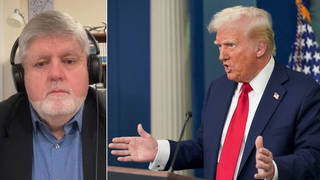
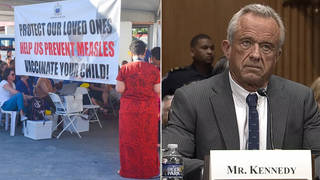
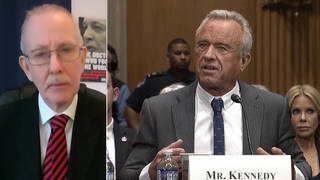
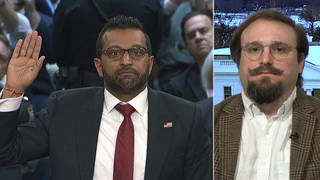






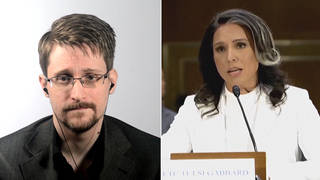
Media Options